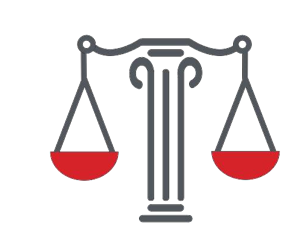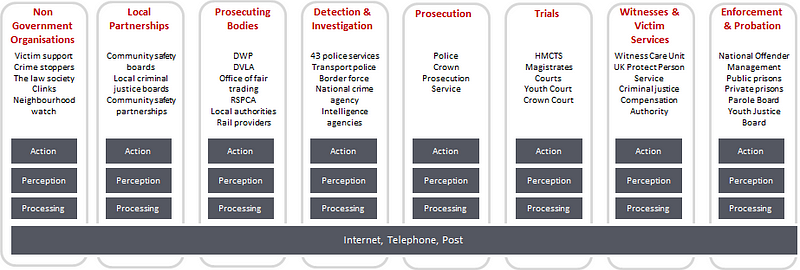How might distributed ledger technology transform the justice system?
October 03, 2018
Transforming the justice system with Corda distributed ledger technology

Corda a Distributed Ledger Technology can help transform the UK justice system by joining up services and opening up data, while improving efficiency, transparency, trust and security. This would free up £bns annually to reinvest in frontline services.
The Problem
The Justice system infrastructure has evolved incrementally over the years without consistent architectural design and is characterised by siloed data stores, maintained largely independently by each organisation in the justice system.
The redundant storing of common information provides resilience, however this gives rise to expensive, time-consuming issues:
Lack of interoperability — Her Majesty’s Inspectorate of Constabulary (HMIC) found that during a standard domestic burglary prosecution there were 70 ‘rubbing points’ where case progress was dependent upon one justice agency securing information from another.
Data Entry Accuracy — A 2015 inspection found that almost one in five charging decisions by the police were incorrect and the NAO has suggested that forces are failing to build files of sufficient quality or to appropriately disclose evidence.
Process leakage — A significant proportion of evidence or case information is lost as it is transferred through the current outdated and manually-intensive and largely paper based systems.
No common case management platform — Although the vision is to build a single system where individuals can have access to case files and other relevant information regardless of which criminal justice agency they work for.
Siloed Developments — without a shared vision of integrated working, and pooled budgets, it will remain impossible to remove large areas of inefficiency from a complex web of interactions between multiple organisations.
Todays Criminal Justice System is built with inefficient data silos which requires significant time and cost with reconciliation processes.

Solution
Imagine a criminal justice system where each organisation retained their distributed business model, culture, budgets, data, policies and procedures, yet share and synchronise data with high levels of privacy, security and confidentially, thus increasing transparency and trust in the justice systems whilst increasing efficiency and reducing costs.
The initial Distributed Ledger Technology that underpins bitcoin, was further developed for Ethereum and Hyperledger but still fell short of enterprise standards. To solve this the The Corda Team has collaborated to build a distributed ledger platform that is enterprise grade and enables highly secure business process automation, data synchronisation and real-time settlement of payments across multiple financial services organisations.
The corda platform and corda distributed applications could be used by HMCTS and the wider Justice System to synchronise legacy data stores, join up systems and services, which will enable shared data in a highly secure, confidential and private manner across the entire justice landscape. Citizens could also be given greater access to information which would provide an additional benefit in improving public access to data.
ISSUE RESOLUTION
Solving Lack of interoperability — Smart contracts could remove the 70 ‘rubbing points’ where case progress was dependent upon one justice agency securing information from another; this interoperability could be automated with smart contracts.
Solving Data Entry Accuracy — Data stored in a distributed ledger can be validated by multiple nodes significantly reducing data entry inaccuracy.
Solving Process leakage — Data stored in a decentralised database that can be shared with appropriate levels of privacy and security increases the benefits and business case for digitising largely paper based systems.
Solving No common case management platform — Achieving a vision of building a single centralised system where individuals can have access to case files and
other relevant information regardless of which criminal justice agency they work for is very challenging; however connecting existing datasets thus creating a virtual single dataset build on a decentralised system is significantly less challenging.
Solving Siloed Developments — a shared vision and pooled budgets is really difficult to achieve, but what if every organisation could retain their own vision and budgets whilst synchronising data locally, nationally and internationally; this is possible with distributed ledger technology.

Conclusion
The UK Land Registry has completed 1 year proof of concept and is now commencing the 2nd year of the Digital Street Project. The team is exploring how Distributed Ledger Technology and Smart Contracts can make land registration and the property buy / sell process faster, simpler and easier by bringing together all the organisations involved in the property buy sell process; estate agents, conveyancers, banks and HMRC.
This is a similar challenge to that of UK justice, and like HM Land Registry, HM Courts and Tribunals could be the organisation within the justice systems to start the conversation and catalyse collaboration and transformation across the entire system.
